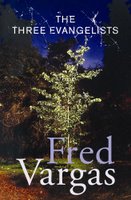
Fred Vargas is the pseudonym of a French woman who is a historian and archaeologist. Her profession shows through more in the recentloy translated The Three Evangelists than in her earlier detective novels (see earlier posts here) which were odd, a bit mannered, but more conventional than the new one. Her writing is typically Dickensian, attributing a very specific personality profile to each character and continuing to emphasize that profile throughout the novel. In The Three Evanvelists, the three characters referred to in the title (Mathieu, Marc, and Lucien) are historians of, respectively, prehistory, medieval, and "Great War" eras. They rent a house, each taking a floor that is an archaeological stratum based on their historical periods (Mathieu on the ground floor, and so forth). And the personalities of each are defined by their era of study: Mathieu a primitive, etc. But Vargas employs these perhaps too consistent characteristics in a comic vein that never becomes irritating, and the comedy never overwhelms the story, which builds slowly and inexorably to a violent conclusion. And no one in crime fiction today can top Vargas's "mcguffin" in this novel: a tree that appears with no warning or explanation in a former opera diva's back yard. The story of the tree is in some senses more compelling than the murder plot, and has certain characteristics of Poe's detective stories, perhaps a nod to the inventor of the genre. Vargas's novels are comic without being funny, in the sense that she moves characters around in a narrowly defined artificial world with more purely authorial intent than realism, as well as the sense of her narrowly defined and rigidly maintained character portrayals. Vargas is working in a genre that might be called satire (though there's no clear object being satirized, other than the modern world). As such, her novels may be an acquired taste. I must confess that I found her first two novels a bit peculiar, stylized in almost the way that Jacques Roubaud's "Hortense" novels, which are anything but noir though based on a kidnapping story. Roubaud is concerned with literature, not crime, and that can't be said of Vargas--her tales compel the reader with atmosphere, character, and narrative, rather than cleverness, as is the case with Roubaud. But there is enough stylization to make a comparison with Roubaud apt. Nevertheless, these perhaps very French novels are an interesting counterpoint to the much more realistic crime novels of Dominique Manotti, Jean-Patrick Manchette (whose 3 to Kill is a wonderful revenge story) or Chantal Pelletier (more of a purely genre writer).

No comments:
Post a Comment